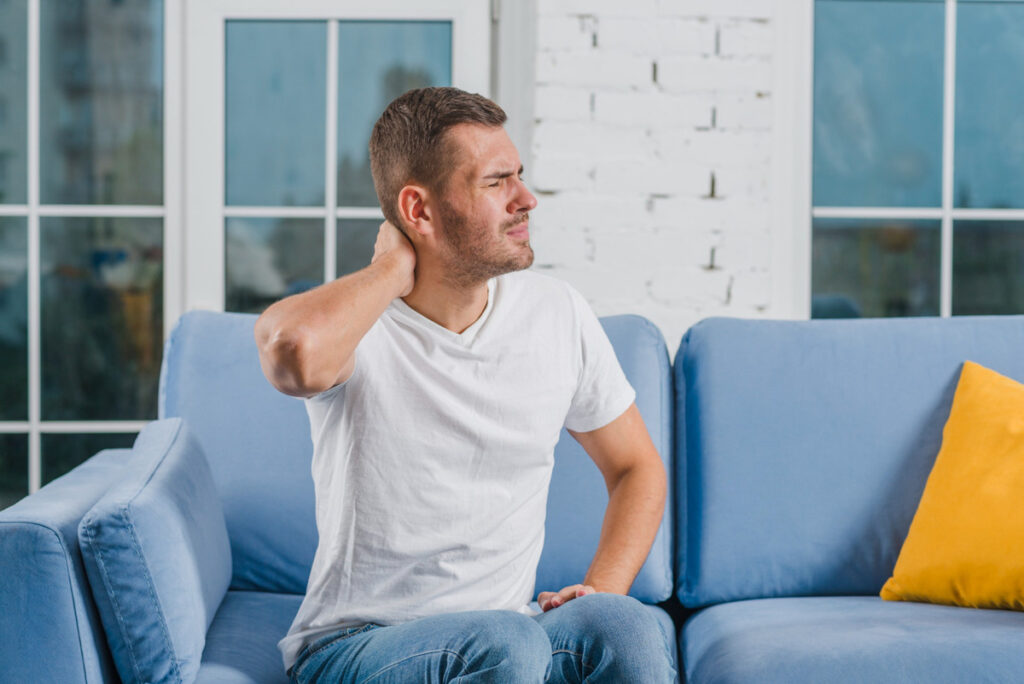Can you get tinnitus from neck and shoulder sprain?
While most people associate tinnitus with loud noises or ear infections, there are other less obvious causes of this condition, including neck and shoulder injuries.
A sprain in the neck or shoulder can trigger a series of physical responses that, in turn, can contribute to the development of tinnitus.
In this article, we will explore how neck and shoulder injuries can lead to tinnitus, the science behind it, and what steps you can take to alleviate both conditions.
Can You Get Tinnitus from Neck and Shoulder Sprain?
Tinnitus is typically characterized by ringing, buzzing, or hissing sounds in the ears, but its causes are varied and sometimes difficult to pinpoint.
A neck or shoulder sprain can affect the body’s nerve and blood flow systems, potentially leading to tinnitus.
When you experience a sprain, the muscles and ligaments in the neck or shoulder area become overstretched, causing inflammation and tension.
This tension can affect the nerves connected to the inner ear and even alter blood flow, both of which are crucial to healthy hearing.
The cervicogenic connection is one way a neck injury can lead to tinnitus, as damage or irritation to cervical spine nerves can influence auditory function.
Additionally, tight muscles in the shoulders can create further stress on the neck, exacerbating the condition and potentially leading to ringing in the ears.
Neck injuries and the associated tension can affect the auditory system. Learn more about the relationship between injuries and tinnitus on the NIDCD website.
The Role of Nerves in Tinnitus Development
The nerves that originate from the neck and shoulders are closely linked to the auditory pathways in the brain.
Injury or inflammation in the cervical spine can cause compression of these nerves, disrupting their communication with the brain and the inner ear.
When the nerves are under stress or irritated, they may send incorrect signals to the brain, resulting in the perception of sound where there is no external source, causing tinnitus.
Moreover, the autonomic nervous system, which controls unconscious bodily functions, can also become involved, contributing to a feeling of fullness in the ears and further exacerbating tinnitus symptoms.
When the neck or shoulder sprain impacts nerve pathways, it often leads to increased muscle tension and altered nerve function, both of which can worsen tinnitus.
How Poor Posture and Tension Can Contribute to Tinnitus
Poor posture, especially in combination with neck or shoulder injuries, can create long-lasting tension in the upper body.
Muscle strain in the neck, upper back, and shoulders can lead to misalignment of the spine, which may affect the auditory system.
Over time, these tension and alignment issues can cause changes in the blood flow to the inner ear, potentially triggering or exacerbating tinnitus.
Additionally, stress and muscle tension are often interconnected, as individuals with neck or shoulder pain may experience heightened stress levels, which can contribute to the onset of tinnitus symptoms.
When muscles in the neck and shoulders are tight, they can also restrict circulation and pressure on nearby nerves, increasing the risk of tinnitus development.
Correcting posture and reducing tension through physical therapy or stretching exercises can help alleviate both the musculoskeletal and auditory symptoms.
Other Health Conditions Associated with Tinnitus
Tinnitus often coexists with other conditions, some of which may be related to neck and shoulder injuries.
For example, temporomandibular joint (TMJ) disorders can lead to both jaw pain and tinnitus, especially when neck tension and jaw misalignment are involved.
A misaligned jaw can impact the surrounding muscles and nerves, further increasing tension in the neck and shoulders and triggering tinnitus.
Other common conditions that may contribute to tinnitus include ear infections, sinus issues, and even stress or anxiety, all of which can be aggravated by neck or shoulder injuries.
It’s important to address the root cause of both neck and shoulder pain and tinnitus symptoms in order to manage them effectively.
How to Manage Tinnitus Caused by Neck and Shoulder Injuries
Managing tinnitus associated with neck and shoulder injuries involves a combination of physical treatments and lifestyle adjustments.
Physical therapy is a common treatment, helping to restore mobility and relieve muscle tension in the neck and shoulder areas.
A trained therapist can teach you exercises to improve posture, strengthen muscles, and reduce the strain that may be contributing to tinnitus.
In addition to physical therapy, practicing stress reduction techniques, such as deep breathing exercises, yoga, or meditation, can help alleviate the tension that exacerbates tinnitus symptoms.
Regular breaks and proper ergonomics, especially when sitting for long periods, are essential for preventing further strain on the neck and shoulders.
Heat or cold compresses may also provide relief from neck and shoulder pain, indirectly helping to reduce tinnitus symptoms.
Natural Remedies for Tinnitus Relief
While treating the underlying neck or shoulder injury is crucial for managing tinnitus, there are also natural remedies that can help alleviate symptoms.
Sonus Complete is a supplement designed to support ear health and reduce the severity of tinnitus symptoms.
It contains natural ingredients such as ginkgo biloba, hawthorn berry, and vitamin B12, known for their ability to improve blood circulation and support nerve health.
These ingredients can help reduce inflammation in the inner ear and improve communication between the auditory system and the brain.
Sonus Complete is particularly effective for those whose tinnitus is linked to nerve tension or poor circulation due to neck or shoulder injuries.
By incorporating Sonus Complete into your daily routine, you can support your ear health while addressing the underlying causes of tinnitus and neck pain.
If you’ve developed tinnitus following a neck or shoulder sprain, it’s important to address both conditions together for optimal relief.
Sonus Complete provides natural support for tinnitus symptoms and overall ear health, helping to alleviate discomfort and promote better hearing.
Visit the official Sonus Complete website to learn more and begin your journey to clearer, calmer ears today.









